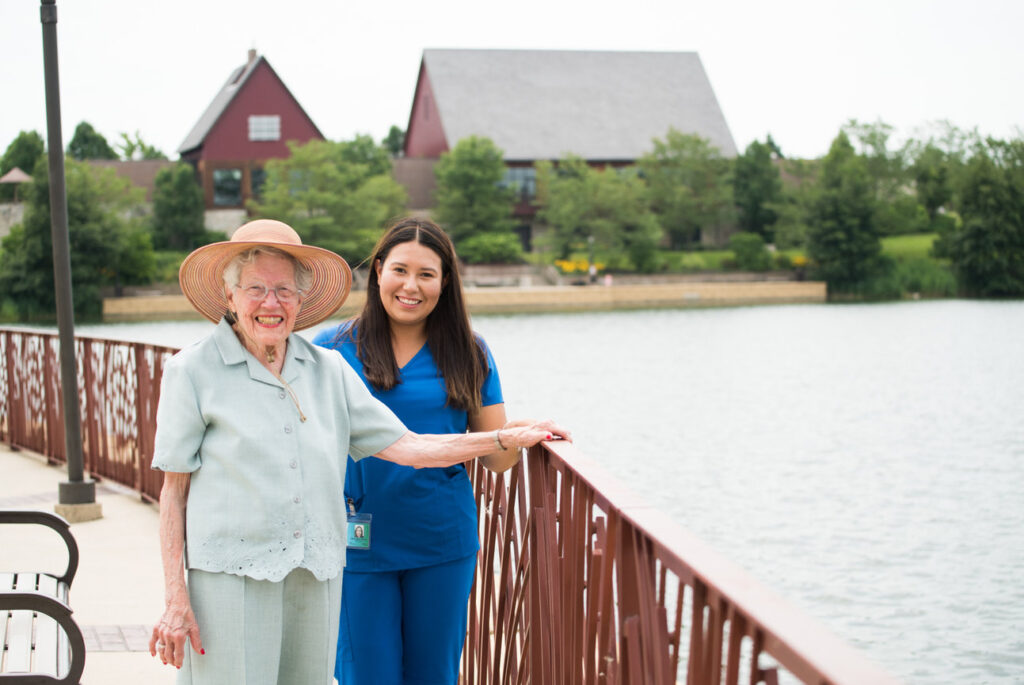Senior Care News Article #35
Senior Care News Article #35
Benefits of In-Home Dementia Care Chicago: Keep Your Loved Ones Safe
May 7, 2025 | Updated: Dec. 27, 2025, 10:05 a.m.

Maria, a retired teacher in Pilsen, felt her heart race whenever her husband wandered toward their front door.
“She couldn’t sleep, worrying he’d get lost in the city,” she says. When she called a local agency, they quoted $7,000/month, more than her pension.
Like thousands of Chicago families, Maria felt trapped, until she discovered affordable, compassionate in-home dementia care for Chicago seniors.
Protect Your Loved One Without Sacrificing Savings or Sanity
You’ll learn Chicago-specific secrets other people ignore, including:
- Free programs
- Bilingual caregivers
- Why Applied Home Health Network (Applied HHN) is the Number One Choice for medical care at home
Read Also: What is the Value of a Professional Caregiver
Why In-Home Dementia Care in Chicago Works Best for Seniors
Over 230,000 Illinois seniors live with Alzheimer’s, many in Chicago.
Nursing homes can cost $6,500+/month, but in-home dementia care allows your loved one to stay in their own home, a familiar place that reduces confusion.

Why Chicago Families Choose Home Care
- Familiar Surroundings: Seniors recognize their Rogers Park apartment or Bronzeville rowhouse, which calms anxiety.
- Local Expertise: Agencies like Applied HHN know Chicago’s neighborhoods, weather, and resources.
- Cost Savings: Pay only for the care you need (e.g.,
$30/hour for help with meals vs. $200/day for facilities.)
How to Find Trustworthy Caregivers in Chicago
Step 1: Demand Chicago-Trained Caregivers
Not all caregivers understand our city’s challenges. Ask:
- “Do you train for Chicago winters?” (e.g., backup plans for blizzards)
- “Can you handle wandering emergencies?” (e.g., using Silver Search IL, a free Chicago program to locate missing seniors)
Step 2: Seek Bilingual Caregivers
If your loved one speaks Spanish, Polish, or Tagalog, communication is key. Many Chicago caregivers are multilingual.
Step 3: Verify Medical Credentials
For seniors needing wound care or therapy, choose Medicare-certified providers like Applied HHN. Their nurses handle:
- Diabetes management
- Post-stroke rehab
- Pain relief for arthritis
How to Pay for Care Without Breaking the Bank
Secret 1: Illinois Medicaid Waiver
Low-income families qualify for free home care. Applied HHN helps with applications, no lawyer needed.
Secret 2: Veterans’ Benefits
Chicago vets can get $2,300+/month via the VA’s Aid & Attendance program. Applied HHN works with VA hospitals like Jesse Brown.
Secret 3: Community Care Program
Illinois offers free help for seniors who can’t afford care.
Call 800-252-8966 or visit your local Chicago senior center.
Dementia-Proofing Your Chicago Home
Safety Upgrade 1: Smart Home Tech
- Smart Locks (e.g., August Wi-Fi): Stop wandering with codes only caregivers know. Buy at Adaptive Home Medical (stores in Logan Square & Hyde Park)
- Medication Dispensers: Automatic pill reminders (e.g., Hero) prevent overdoses
Safety Upgrade 2: Fall Prevention
- Remove throw rugs (common in Chicago’s vintage apartments)
- Install grab bars in bathrooms (available at Home Depot on Elston Ave)
Safety Upgrade 3: Visual Labels
- Use pictures + words on doors (e.g., “BATHROOM” + toilet image)
- Paint the stairs bright colors for better visibility
Emergency Plans Every Chicago Family Needs
Blizzard Kit:
- 3-day supply of meds, water, and non-perishable food (e.g., canned pierogi from Shop & Save)
- Backup generator for oxygen machines
Wandering Kit:
- GPS tracker (free through Project Lifesaver at Chicago PD)
- Recent photo and medical info in a waterproof bag
24/7 Help:
Applied HHN nurses respond to emergencies day or night, even during snowstorms
Respite Care – Chicago’s Best-Kept Secrets
Free/Cheap Options for Exhausted Caregivers:
- Chicago Park District:
Senior Days at Garfield Conservatory (free crafts, music). - Little Brothers – Friends of the Elderly:
Volunteers stay with seniors so you can rest. - Adult Day Centres:
Try the Council for Jewish Elderly in Rogers Park ($15/day).
Why Applied HHN Is Chicago’s Top Choice for In-Home Dementia Care
Applied HHN isn’t just another agency, it’s Chicago’s most trusted medical home care provider.
Here’s why families choose them for in-home dementia care for Chicago seniors:

- Medicare-certified nurses who handle complex care: diabetes, stroke rehab, pain management
- Bilingual caregivers familiar with Chicago’s diverse neighborhoods
- 24/7 support, even during blizzards or power outages
- Expertise in navigating free state programs and VA benefits
Compassionate, culturally aware care tailored to your family’s unique story
1. Skilled Medical Care at Home
- Wound Care: Prevent infections without hospital trips.
- Physical Therapy: Recover from falls in your living room.
- Pain Management: Expert help for arthritis or cancer.
2. $0 Out-of-Pocket Costs with Medicare
Medicare covers 100% of:
- Nurse visits
- Medical equipment (e.g., hospital beds)
- Therapy sessions
3. Chicago Doctors Recommend Them
Applied HHN works with top hospitals like Rush and Northwestern. After discharge, their nurses ensure a smooth transition home.
How to Start
- Call Applied HHN at (773-941-5643) for a free home visit.
- A nurse assesses your loved one’s needs in their kitchen or living room.
- You get a personalised care plan (e.g., “Therapist visits Mon/Wed/Fri”).
What If My Loved One Needs More Help Later?
Applied HHN grows with your family:
- Assisted Living Transition: They recommend facilities like Smith Village in Beverly.
- Hospice Care: Nurses come daily to manage pain and keep seniors comfortable at home.
See Also: Is Home Care Only for the Elderly?
Get Help Today
Don’t wait for a crisis.
- Download Our Free Guide: “Chicago’s Dementia-Proof Home Checklist” (includes coupons for local safety gear).
- Call Applied HHN Now at (773-941-5643) — they answer 24/7.
- Share this with your brother in Bridgeport or your mom’s doctor in Lincoln Park.
“You don’t have to face dementia alone. Let Chicago’s experts help your family stay safe, and stay home.”
Frequently Asked Questions (FAQs)
1. What are the benefits of a dementia care home?
- Specialized 24/7 Care
Staff with dementia-specific training provide round-the-clock support for daily tasks (bathing, dressing), medical needs, and behavioral challenges (e.g., agitation, paranoia). This reduces hospitalizations and ensures safety during emergencies. - Dementia-Secure Environments
Facilities prevent wandering (a risk for 60% of dementia patients) via locked exits, enclosed gardens, circular hallways, and monitored outdoor spaces. Additional safety features include grab rails, anti-slip flooring, and simplified layouts to reduce confusion. - Personalized Cognitive & Social Activities
Tailored programs (art therapy, music sessions, reminiscence therapy) stimulate memory and engagement. Group activities combat isolation, while one-on-one sessions align with past interests (e.g., gardening, cooking) to maintain identity and purpose.
2. Benefits of In-Home Dementia Care – Chicago
Key Benefits of In-Home Care for the Elderly
- Personalized, One-on-One Attention
Caregivers provide tailored support based on the individual’s needs, preferences, and routines, unlike facilities where staff divide attention among multiple residents. This fosters trust and continuity in care. - Familiar & Comfortable Environment
Staying at home allows seniors to remain in a known setting, reducing stress and confusion, especially important for those with dementia, who may struggle with new surroundings. - Maintained Independence & Dignity
In-home care promotes autonomy by allowing seniors to follow their schedules (meals, activities) while receiving discreet assistance with tasks like bathing, dressing, or mobility. - Safety & Fall Prevention
Caregivers help minimize hazards (clutter, poor lighting) and assist with movement, reducing fall risks, a leading cause of injury in seniors. They also monitor for health changes.
3. Is it better to keep a dementia patient at home?
Home care works best for early-stage dementia if:
- The home is safe (no fall risks, wandering hazards).
- Family/caregivers can provide 24/7 supervision or hire help.
- The patient is calm in familiar settings.
A care home may be needed for late-stage dementia if:
- Wandering, aggression, or falls make home unsafe.
- Caregivers are overwhelmed (burnout is common).
- Medical needs (infections, mobility issues) require professional care.
4. What is the purpose of the home for the elderly?
The purpose of a home for the elderly (e.g., assisted living, nursing home, or dementia care facility) is to provide safe, structured care while promoting quality of life when aging at home becomes unsafe or unsustainable.
1. What are the benefits of a dementia care home?
- Specialized 24/7 Care
Staff with dementia-specific training provide round-the-clock support for daily tasks (bathing, dressing), medical needs, and behavioral challenges (e.g., agitation, paranoia). This reduces hospitalizations and ensures safety during emergencies. - Dementia-Secure Environments
Facilities prevent wandering (a risk for 60% of dementia patients) via locked exits, enclosed gardens, circular hallways, and monitored outdoor spaces. Additional safety features include grab rails, anti-slip flooring, and simplified layouts to reduce confusion. - Personalized Cognitive & Social Activities
Tailored programs (art therapy, music sessions, reminiscence therapy) stimulate memory and engagement. Group activities combat isolation, while one-on-one sessions align with past interests (e.g., gardening, cooking) to maintain identity and purpose.
2. Benefits of In-Home Dementia Care – Chicago
Key Benefits of In-Home Care for the Elderly
- Personalized, One-on-One Attention
Caregivers provide tailored support based on the individual’s needs, preferences, and routines, unlike facilities where staff divide attention among multiple residents. This fosters trust and continuity in care. - Familiar & Comfortable Environment
Staying at home allows seniors to remain in a known setting, reducing stress and confusion, especially important for those with dementia, who may struggle with new surroundings. - Maintained Independence & Dignity
In-home care promotes autonomy by allowing seniors to follow their schedules (meals, activities) while receiving discreet assistance with tasks like bathing, dressing, or mobility. - Safety & Fall Prevention
Caregivers help minimize hazards (clutter, poor lighting) and assist with movement, reducing fall risks, a leading cause of injury in seniors. They also monitor for health changes.
3. Is it better to keep a dementia patient at home?
Home care works best for early-stage dementia if:
- The home is safe (no fall risks, wandering hazards).
- Family/caregivers can provide 24/7 supervision or hire help.
- The patient is calm in familiar settings.
A care home may be needed for late-stage dementia if:
- Wandering, aggression, or falls make home unsafe.
- Caregivers are overwhelmed (burnout is common).
- Medical needs (infections, mobility issues) require professional care.
4. What is the purpose of the home for the elderly?
The purpose of a home for the elderly (e.g., assisted living, nursing home, or dementia care facility) is to provide safe, structured care while promoting quality of life when aging at home becomes unsafe or unsustainable.










